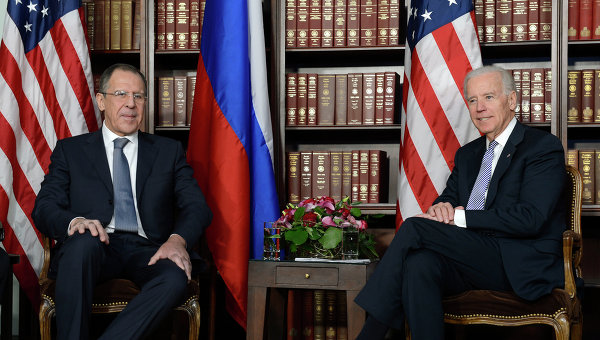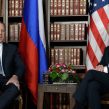
Washington Attempts to Put Relations with Moscow ‘Back on Track’
Publication: Eurasia Daily Monitor Volume: 10 Issue: 23
By:

According to Russian diplomatic sources, during a meeting last weekend in Munich on the sidelines of the annual international security conference, United States Vice President Joseph Biden assured Russian Foreign Minister Sergei Lavrov that Washington wants to put bilateral relations “back on track” after a period of growing strain and public discord (Kommersant, February 4). In his keynote address at the conference, Lavrov lambasted the US and the West over ballistic missile defense (BMD); support of regime change in Libya and Syria, which he equated with support for terrorism; as well as of ignoring Russian security interests in Europe and the former Soviet space. But in speaking to Russian journalists after meeting Biden, Lavrov sounded much more positive, stressing a desire to work together on solving problems and singling out Afghanistan as an area where cooperation and coordination are most needed (www.mid.ru, February 2; https://www.mid.ru/brp_4.nsf/newsline/8C06FC31D7B8F91A44257B07001FCDBD; https://www.mid.ru/brp_4.nsf/0/608C6FACACB72ED144257B06003EE852).
This week, the newly appointed US Secretary of State John Kerry and Lavrov talked on the phone and, according to Lavrov, Kerry accepted an invitation to visit Moscow (Interfax, February 6). The US National Security Advisor Thomas Donilon is expected in Moscow “soon” to meet with Lavrov and President Vladimir Putin, though the exact date of the visit has yet to be set (www.mid.ru, February 2). The acting US Under Secretary of State for Arms Control and International Security Rose Gottemoeller, who was the chief negotiator of the New Strategic Arms Reduction Treaty (New START), signed in April 2010, is expected in Moscow this month to discuss arms control and, in particular, the future of the Cooperative Threat Reduction (CTR) Program (Kommersant, February 4).
Under the CTR, also known as Nunn-Lugar, based on a 1992 US law sponsored by Senators Sam Nunn and Richard Lugar, billions of US taxpayers dollars were spent (some $8 billion in Russia) to secure and dismantle former Soviet weapons of mass destruction and their associated infrastructure. Nuclear submarines, missiles, chemical weapons and thousands of nuclear warheads have been safely dismantled through the CTR, which has been the longest-lasting and most successful US-Russian cooperation program since the demise of the Soviet Union. Next June, the CTR agreement expires, and Moscow does not want to renew it. Russian officials do not want an agreement that gives the US government and contractors working in Russia on CTR-financed projects immunity from liability for any environmental or other damage that may happen as a result of an accident (since 1992, no such accidents have been reported). The Russian authorities also wish to curtail the right of the Pentagon, which runs the CTR program, to inspect Russian military installations, where security was upgraded using US taxpayer dollars to certify that the money and equipment was not misappropriated. Moscow believes the Americans use the CTR program as a cover for espionage (Kommersant, February 4).
The Kremlin apparently also trusts that Russia has enough petrodollars to ditch CTR handouts, which it sees as degrading to the great power status Putin is intent on building. For Washington, the immunity from liability as well as the verification mechanism are essential, since US budgetary funds are involved. Gottemoeller will face an uphill task to find a formula to somehow retain the CTR that would be acceptable to both the Kremlin and the US Congress.
In 2009, the “reset” of soured US-Russian relations was spearheaded by arms control talks that led to the New START signed by Barack Obama and Dmitry Medvedev. Then, both countries shared a clear mutual interest in reaching an agreement: The Obama administration badly wanted some foreign policy success, while Moscow desired to reduce the US nuclear arsenal—its own was already swiftly shrinking as Cold War-era weapon systems were being mothballed. The New START allows both the US and Russia to have 700 deployed strategic delivery systems—intercontinental ballistic missiles (ICBMs) and long-range strategic bombers. But by 2011, when the treaty went into force, Russia already had only 500 to 550 strategic delivery systems left (Vedomosti, December 24, 2010). Since then, the situation has changed: Russia is developing and deploying a new generation of strategic nuclear weapons to replace its old arsenal. According to the commander of the Strategic Rocket Forces (RVSN), Colonel General Sergey Karakayev, by 2021, some 98 percent of deployed ICBMs aimed at the US “will be new.” A new heavy (100-ton) ICBM is being developed, according to Karakayev, to “break through” any future US missile shield (RIA Novosti, December 14, 2012). Disagreements over BMD may be cited in Moscow as a pretext to stall on arms control; but more importantly, the Russian military and the military-industrial complex do not seem at all interested in any agreement with Washington that would undermine present nuclear armament programs.
This apparently leaves Afghanistan as the only area left for any meaningful cooperation. “NATO [the North Atlantic Treaty Organization] is leaving,” Lavrov told journalists in Munich, “But we and our Central Asian allies will stay in the region, which requires to more closely and transparently coordinate our approaches [with Washington]” (www.mid.ru, February 2). Of course, Moscow wants NATO and the US out of the region, but in an organized fashion and without a breakdown of regional security, allowing an orderly takeover by a Russian-led coalition involving the Collective Security Treaty Organization (CSTO) and the Shanghai Cooperation Organization (SCO).
Neither arms control nor Afghanistan seems to be a steady base for any setting “back on track” of relations, while there are other serious and immediate problems upsetting bilateral ties. The situation in Syria will, apparently, get worse; and as the present regime crumbles, Moscow will blame Washington for destroying its last close ally in the Middle East. If pro-democracy protests continue in Moscow, the Putin regime will also blame Washington. No easy “back on track,” even if the Obama administration goes unashamedly Realpolitik and pays only lip service to escalating repressions and human rights violations inside Russia.




